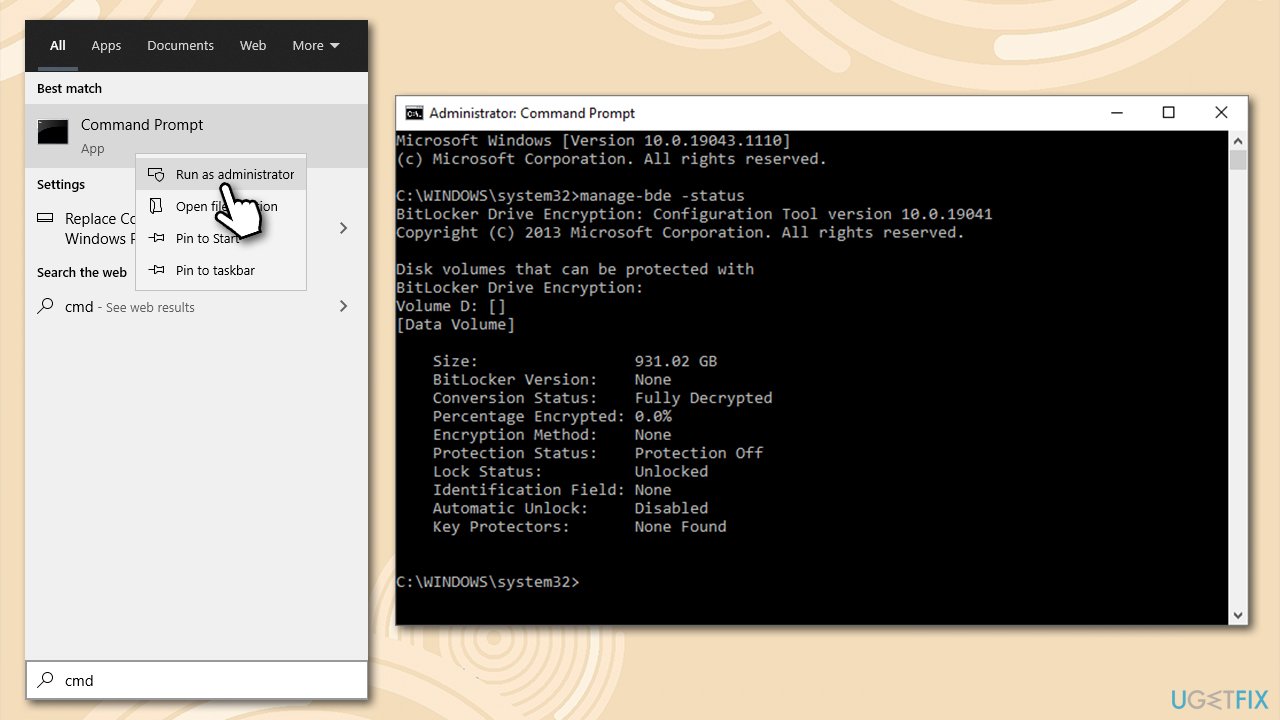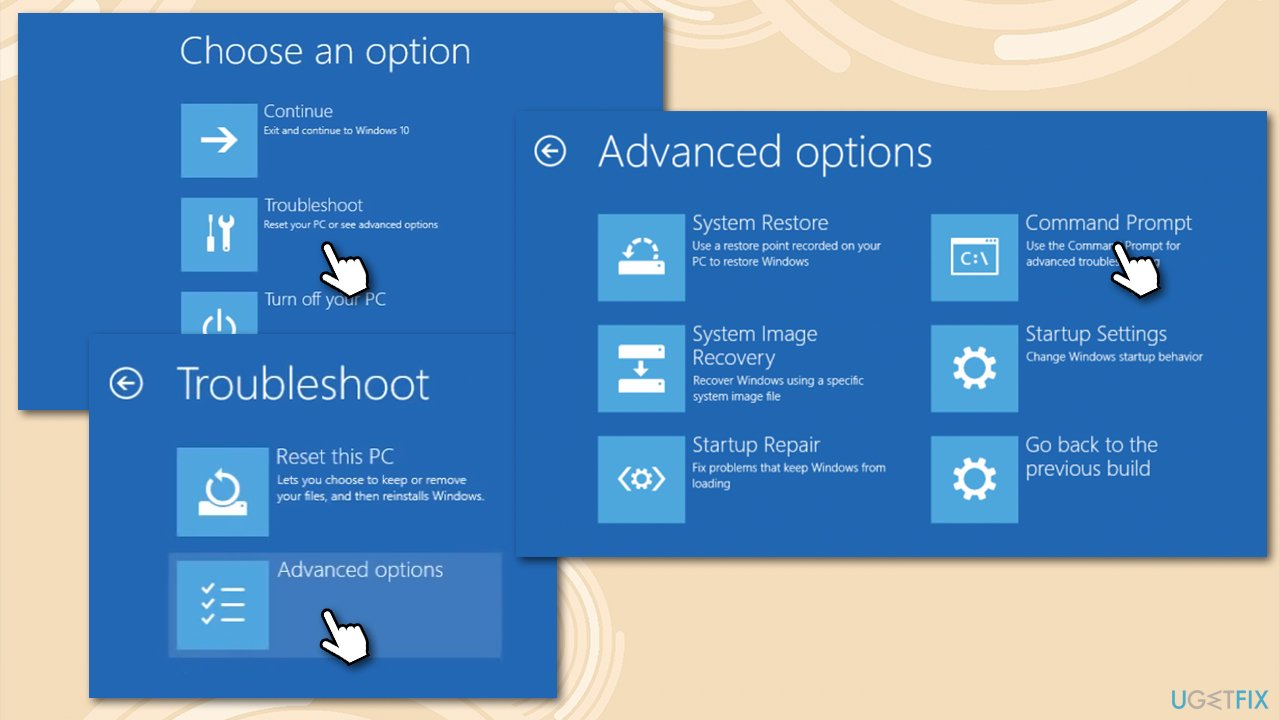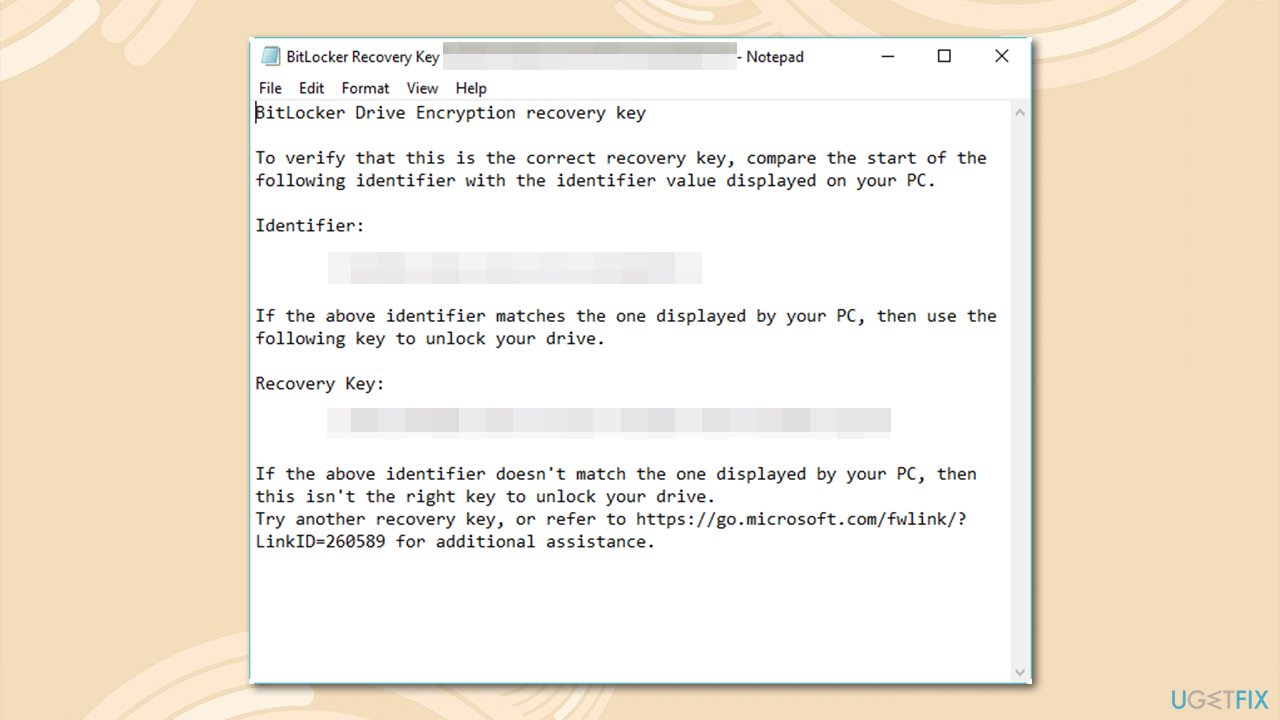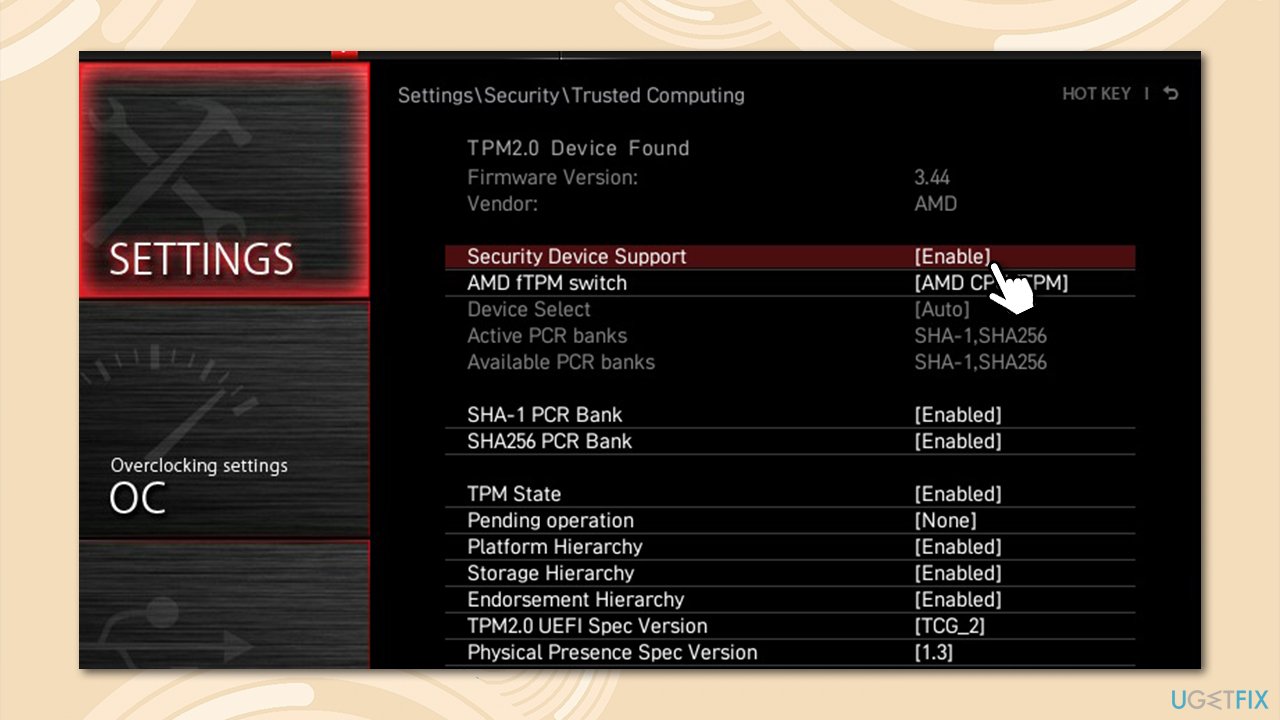Question
Issue: How to fix new CPU installed, fTPM/PSP NV corrupted or fTPM/PSP NV structure changed?
Hi. I don't usually turn off my PC when I go away from it. Once I came back, the screen was blank as per usual. I tried to turn the PC on, but nothing happened, so I hard-rebooted it. As soon as it started loading, I received a “New CPU installed. fTPM NV corrupted or fTPM NV structure changed” error on the black screen. I pressed N to keep the previous setting (which seemed logical to me), but Windows failed to boot, and I received the same error. Please help.
Solved Answer
fTPM NV structure corrupted or changed error usually affects Windows 10 desktops or laptops that use TPM – Trusted Platform Module. TPM is a secure cryptoprocessor with the sole purpose of securing hardware. Its integrated cryptographic keys[1] can be used to encrypt anything from installing new programs, changing settings in your BIOS/UEFI, or even logging into Windows systems.
There are five types of TPM implementations,[2] including Discrete (dTPM), Software (sTPM), Integrated (iTPM), Hypervisor (hTPM) and Firmware (fTPM), which seems to be the problem here. Firmware TPM (commonly used by AMD, Intel, and Qualcomm) runs in the CPU environment and is software-only-based.
The issue seems to occur seemingly out of nowhere – users reported that they simply went away from their computers for some time, and, after they came back, they saw the black screen fTPM NV error. The full error message reads as follows:
New CPU installed. fTPM NV corrupted or fTPM NV structure changed.
Press Y to reset fTPM. If you have Bitlocker or encryption enabled, the system will not boot without a recovery key.
Press N to keep previous fTPM record and continue system boot. fTPM will not enable in new CPU, you can swap back to the old CPU to recover TPM related keys and data
In most cases, users choose to go with an N option, especially if they received the error unexpectedly. Once the loading sequence continues, they are then prompted to enter their PIN, and this is where they encounter a problem again. As soon as the device is rebooted, users see the same error and are not able to continue using their computers normally.
In other cases, users themselves enabled the fTPM feature via BIOS to run Windows 11. In this case scenario, they are able to boot into Windows after pressing any button, although the message returns each time they load their device – this is because BIOS[3] sees it as a new CPU every time the PC is booted.
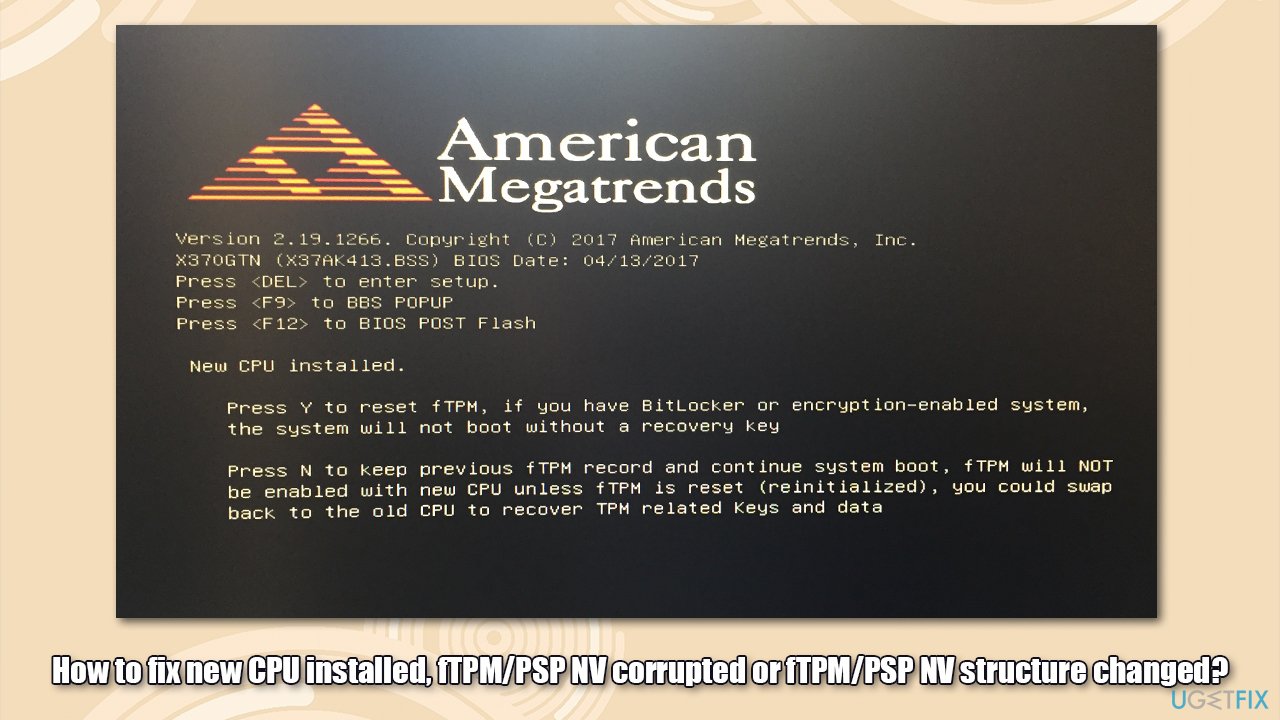
In both cases, it is possible to fix the problem. If you keep getting issues with your Windows device, we recommend you try running a PC repair tool FortectMac Washing Machine X9, as it is capable of remediating corrupted registries, remove malware, and replace damaged system files with brand new ones.
1. Check whether you are using BitLocker
BitLocker is a built-in Windows feature that allows users to encrypt their data and protect it from unauthorized access. You should first check whether your system has it enabled:
If you can log into Windows:
In order to access Windows, simply press N in the error screen.
- Type cmd in Windows search
- Right-click on Command Prompt and select Run as administrator
- When User Account Control shows up, click Yes
- Once in the new window, paste the following command:
manage-bde -status - Hit Enter
- Check the Conversion Status and Percentage Encrypted lines – these should hint whether you are using BitLocker.

If you can't log into Windows:
- Restart your computer and interrupt booting sequence three times by pressing and holding Power button each time
- Once in Advanced Startup mode, go to Troubleshoot > Advanced options
- Select Command Prompt

- Now run the command manage-bde -status command via Command Prompt.
If your system is not encrypted, you can reboot it and press Y when prompted. If your system was encrypted, proceed with the next step.
2. Get your BitLocker key
If your system was using BitLocker, you would need a recovery key. The easiest way to get it is by accessing your Microsoft Account > BitLocker Recovery key section on a working computer.
If this option is not available for you, you can also try using the following methods:
- Finding the .txt file on your computer (it was created when you were setting up the encryption) – search for BitLocker Recovery Key.txt file on your PC

- On a printout which was saved when BitLocker was activated
- If you used the computer to sign in to your work or school account via Azure Active Directory, the key can be found in Azure AD account.
3. Disable fTPM feature via BIOS
If you can log on to Windows but you keep receiving the message, you can try turning off the fTPM feature via BIOS.
- Access BIOS by pressing F8, F10, F12, Del, Esc or another button when the system is booting (refer to your laptop or motherboard manufacturer for precise instructions)
- Once inside, go to Advanced Settings/CPU configuration section
- Look for sections like Security Device Support or simply fTPM

- Make sure the option is turned off and restart your PC.
Repair your Errors automatically
ugetfix.com team is trying to do its best to help users find the best solutions for eliminating their errors. If you don't want to struggle with manual repair techniques, please use the automatic software. All recommended products have been tested and approved by our professionals. Tools that you can use to fix your error are listed bellow:
Prevent websites, ISP, and other parties from tracking you
To stay completely anonymous and prevent the ISP and the government from spying on you, you should employ Private Internet Access VPN. It will allow you to connect to the internet while being completely anonymous by encrypting all information, prevent trackers, ads, as well as malicious content. Most importantly, you will stop the illegal surveillance activities that NSA and other governmental institutions are performing behind your back.
Recover your lost files quickly
Unforeseen circumstances can happen at any time while using the computer: it can turn off due to a power cut, a Blue Screen of Death (BSoD) can occur, or random Windows updates can the machine when you went away for a few minutes. As a result, your schoolwork, important documents, and other data might be lost. To recover lost files, you can use Data Recovery Pro – it searches through copies of files that are still available on your hard drive and retrieves them quickly.
- ^ Key (cryptography). Wikipedia. The free encyclopedia.
- ^ [Library] AMD CPU fTPM (Firmware Trusted Platform Module) [MiniTool Wiki]. MiniTool. MiniTool Wiki Library.
- ^ BIOS. Computer Hope. Free computer help since 1998.
